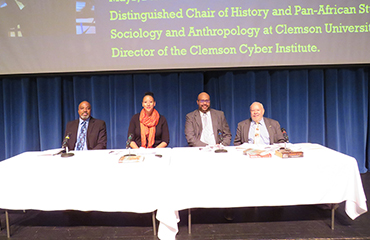
Lander University observed Martin Luther King, Jr. Day with the program "Martin Luther King, Jr.: An Evening of Reflection."
The program featured presentations by Victoria A. Smalls, director of history, art, and culture at Penn Center, on South Carolina's St. Helena Island; Dr. William J. Harris, assistant professor of history at Presbyterian College; and Dr. Orville Vernon Burton, distinguished chair of history at Clemson University. Serving as moderator was Chris Thomas, director of the Dr. Benjamin E. Mays Historic Preservation Site in Greenwood.
Smalls discussed the Penn Center's role as a meeting place for civil rights figures such as King, Ralph Abernathy, Andrew Young and Jesse Jackson. She said that "these retreats at Penn played a significant and even vital part of the evolution of the Southern Christian Leadership Conference and King's participation in the civil rights movement, especially those retreats held from 1965 through 1967."
Harris said that the image people have of King doesn't do justice to the complexities of his personality. In addition to being an advocate for civil rights, laborers and poor people, Harris said, King was also an opponent of the Viet Nam War and American materialism. He wasn't only a preacher, but a husband and father of four. "I think it would be unfair to King and his legacy to reduce him to anything less than his composite whole. He's not one of these things, but a composite of each of them together," Harris said.
Thomas talked about the close relationship between King and Mays, his mentor. "If there hadn't been a Dr. Benjamin Mays, there never would have been a Martin Luther King, Jr.," he said.
Burton credited the Voting Rights Act of 1965, which King fought for, with doing the most to improve conditions for African-Americans. He warned, however, that hard-won freedoms have to be zealously guarded. "Revolutions can go backwards," he said.